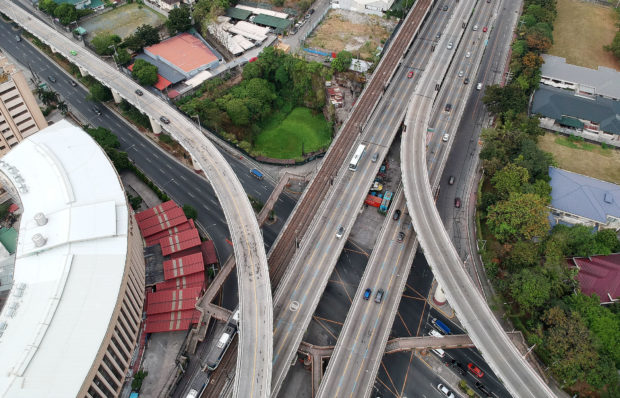
Few motorists traverse EDSA at the Ortigas Center on Sunday, March 15, 2020, the first day of the Metro Manila community quarantine imposed by President Rodrigo Duterte to curb the spread of COVID-19. (Photo by GRIG C. MONTEGRANDE / Philippines Daily Inquirer)
MANILA, Philippines — Public transportation will be suspended all over Luzon under the enhanced community quarantine ordered by President Rodrigo Duterte on Monday.
“Mass public transport facilities shall be suspended,” Cabinet Secretary Karlo Nograles said in a press briefing, reading a memorandum issued by Executive Secretary Salvador Medialdea.
“Land, air and sea travel shall be restricted,” he added.
The enhanced community quarantine takes effect on midnight of March 17 and expires on midnight of April 13.
Tougher quarantine measures were put in place following the continuous spike of coronavirus disease (COVID-19) cases in the country, with 142 infected, including 12 fatalities.
Travelers intending to leave the Philippines from any international airports in Luzon would be allowed to leave within 72 hours, Nograles explained.
“Those who really want to leave will really leave within 72 hours. We have to put a time limit,” said Nograles who is also the spokesperson of the Inter-Agency Task Force (IATF) on Emerging Infectious Diseases.
Inbound international passengers, meanwhile, will be allowed entry “subject to applicable quarantine procedures if coming from countries with existing travel restrictions imposed by the IATF.”
“All inbound Filipino citizens including their foreign spouse and children, if any, holders of Permanent Resident Visa, and holders of 9(e) Diplomat Visas issued by the Philippine Government shall be allowed entry, subject to applicable quarantine procedures if coming from countries with existing travel restrictions imposed by the IATF,” Nograles added.
Meanwhile, private establishments providing basic necessities and activities related to food and medicine production will remain open.
These include “public markets, supermarkets, groceries, convenience stores, hospitals, medical clinics, pharmacies and drug stores, food preparation and delivery services, water-refilling stations, manufacturing and processing plants of basic food products and medicines, banks, money transfer services, power, energy, water and telecommunications supplies and facilities
Health officials have so far recorded 142 cases, including 12 fatalities, related to COVID-19, a respiratory disease caused by a novel coronavirus that first emerged in Wuhan City in China’s Hubei province in late 2019.
The Philippines is currently under a state of public health emergency due to the virus.
The government has also upgraded its alert on COVID-19 from Code Red Sublevel 1 to Code Red Sublevel 2, which is hoisted when there is evidence of community transmission and prevalence of cases beyond what the government can address.
Most people who have COVID-19 can recover as its symptoms are mild, such as fever and cough. But the illness can be more serious for others, possibly leading to pneumonia, especially the older adults and those with existing health problems.
The World Health Organization has declared COVID-19 a pandemic since it has already infected more than 160,000 people and killed over 6,000 in over 140 countries all over the world.
/atm